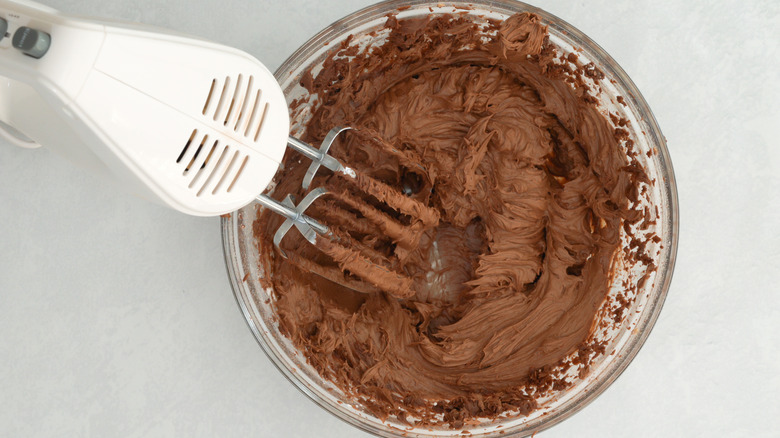The Best Kind Of Chocolate To Use With Buttercream Frosting (And Why)
The secret to a truly divine chocolate buttercream icing recipe lies in choosing the perfect chocolate. Mashed spoke with chef Leanne Tran, who leads the all-female pastry team in charge of the dinner service dessert menu at Bar Blondeau and daily treats at Le Crocodile — both located inside the Wythe Hotel in Brooklyn, where she manages events. When it's time to make that fluffy buttercream frosting, she reaches for chocolate with 50-60% cacao. The reason this works is grounded in simple confectionary science.
If you see a chocolate bar or a container of cocoa powder labeled with a percentage, it's a window into the composition of the product. Chocolate with 50-60% cacao, Tran's go-to for frosting, boasts the right amount of sweetness. This Goldilocks of chocolate, frequently called semisweet, creates buttercream that doesn't overwhelm the palate.
So, what do these cacao ratios mean? Essentially, higher cacao percentages yield more intense flavors, whereas chocolates with lower amounts are sweeter. A chocolate bar boasting 60% cacao, for instance, means 60% of it consists of cocoa butter (the fatty part of the cocoa bean that gives chocolate its famously smooth texture) and cocoa solids (which contribute to flavor), with the rest comprising sugar, flavorings, and other ingredients.
The cacao balance in chocolate can make or break buttercream
Chef Leanne Tran champions the 50-60% cacao range as the sweet spot for creating chocolate buttercream. This blend brings the perfect amount of depth and sweetness, ensuring the frosting on your cake is luscious every single time. Milk chocolate, which boasts under 50% cacao, can be a bit too sugary, resulting in a cloyingly sweet frosting. Plus, the lower cacao content in milk chocolate means it contains less cocoa butter. This can throw off the buttercream's quality, making it less stable.
Chocolate with 70% cacao — commonly known as bittersweet chocolate — delivers bold notes but can easily overpower buttercream with a profile that many consider, well, bitter. However, a higher cocoa butter content can make buttercream more "prone to splitting," according to Tran.
The best chocolate buttercream frosting, made with no less than 50% cacao and no more than 60%, is silky-smooth, pliable, and perfect for cakes, brownies, and other decadent treats like buttercream boards, the festive way to serve dessert. If you happen to whip up too much chocolate buttercream, feel free to experiment with plenty of unique ways to use leftover frosting, such as rimming cocktail glasses, drizzling it over pancakes or waffles, and stirring it into your morning coffee.

